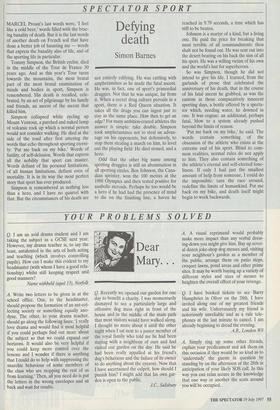SPECTATOR SPORT
Defying death
Simon Barnes
MARCEL Proust's last words were, 'I feel like a cold beer,' words filled with the brac- ing banality of death. But it is the last words of another death on French soil that have done a better job of haunting me — words that express the banality also of life, and of the sporting life in particular.
Tommy Simpson, the British cyclist, died in the middle of the Tour de France 30 years ago. And as this year's Tour turns towards the mountains, the most brutal part of the most brutal examination of minds and bodies in sport, Simpson is remembered. His death is recalled, cele- brated, by an act of pilgrimage by his family and friends, an ascent of the ascent that killed him.
Simpson collapsed while cycling up Mount Ventoux, a parched and naked lump of volcanic rock up which a normal person would not consider walking. He died at the side of the road after first uttering the words that echo throughout sporting eterni- ty: Put me back on my bike.' Words of futility, of self-delusion. Words that express all the nobility that sport can muster. Words defiant of his personal limitations, of all human limitations, defiant even of mortality. It is in its way the most perfect story that sport has ever produced.
Simpson is remembered as nothing less than a hero, and I have no quarrel with that. But the circumstances of his death are not entirely edifying. He was rattling with amphetamines as he made the fatal ascent. He was, in fact, one of sport's primordial druggies. Not that he was unique, far from it. When a secret drug culture prevails in a sport, there is a Red Queen situation. It takes all the drugs you can ingest just to stay in the same place. How then to get an edge? For many ambition-crazed athletes the answer is simple: take double. Simpson took amphetamines not to steal an advan- tage on his opponents, but defensively, to stop them stealing a march on him, to level out the playing field. He died stoned, and a hero.
Odd that the other big name among sporting druggies is still an abomination in all sporting circles. Ben Johnson, the Cana- dian sprinter, won the 100 metres at the 1988 Olympics and then tested positive for anabolic steroids. Perhaps he too would be a hero if he had had the presence of mind to die on the finishing line, a haven he reached in 9.79 seconds, a time which has still to be beaten.
Johnson is a martyr of a kind, but a living one. He paid the price for breaking that most terrible of all commandments: thou shalt not be found out. He was sent out into the desert bearing on his back the sins of all his sport. He was a willing victim of his own and the world's lust for superheroes.
So was Simpson, though he did not intend to give his life. I learned, from the garlands of prose that celebrated the anniversary of his death, that in the course of his fatal ascent he grabbed, as was the custom in those comparatively innocent sporting days, a bottle offered by a specta- tor which, needing water, he downed in one. It was cognac: an additional, perhaps fatal, blow to a system already pushed beyond the limits of reason.
Put me back on my bike,' he said. The words contain something of the obsession of the athlete who exists at the extreme end of his sport. Blind to com- mon realities, normal rules do not apply to him. They also contain something of the athlete's eternal and self-elected lone- liness. If only I had just the smallest amount of help from someone, I could do the impossible: turn the race around, redefine the limits of humankind. Put me back on my bike, and death itself might begin to work backwards.


























































 Previous page
Previous page